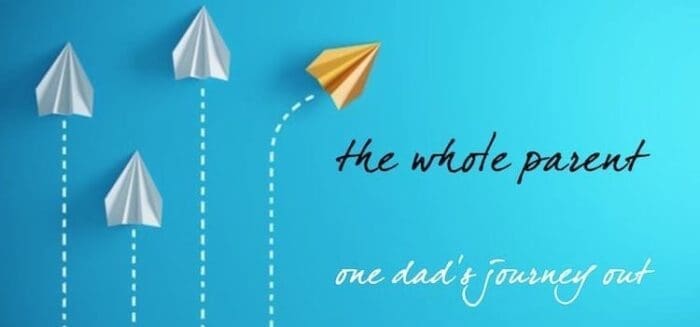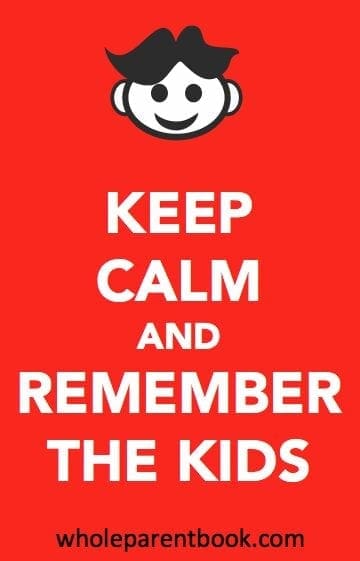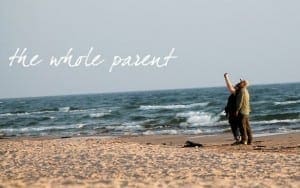One of the biggest jobs in getting to the positive side of divorce is figuring out, and often explaining, how and why you and your co-parent split up. And while most of this work happens within your own mind, you have a lot of people in your life you have to explain things to. And your kids are first up.
In my parent’s divorce, I don’t remember how I found out, but it was raw and unfiltered. I didn’t understand and I didn’t have anyone to talk to about it. I think it happened while I was in third grade, and while I was at school. The memory is sketchy, but something about getting called to the office and talking to my mom on the phone. We were going on a Christmas vacation and my dad wasn’t coming. (I’m sure this isn’t right, but it is an early biographical memory, so the experience is more about the feeling and less about the actual event.)
In the case of my marriage and my kids, I knew that I wanted to do better. And their mom and I worked very hard to learn and negotiate the best way to do it. Since we were in agreement that we would divorce we were able to put our focus on building a parenting plan and exploring what would be best for the kids. We spent our money on a family counselor who specialized in children and divorce rather than lawyers. It was a good decision.
And it was not easy. I was still living in the house when we began seeing our divorce therapist. And there were still large amounts of emotions to process, both together with the therapist and alone as we began to write our own context stories about “what happened.”
In our case, I had gone against the recommendation of our marriage counselor and my then-wife and I refused to simply move out of the house. I saw the way my context-less and unplanned breakup affected me between 3rd and 5th grade, and I was determined to do better for my kids. And perhaps I was also terrified. Yes, I was terrified and ashamed.
So during the months of April and May, while our kids finished up 1st and 3rd grades, we stayed in the house as roommates. And there were some good times along with the bad. There were moments when I imagined we would reconcile, as I hoped we might. We didn’t. We maintained the facade to enable our kids to reach the safety of summer before we dropped the nuclear family bomb on them.
The process of divorce takes time. There are a lot of details to work out. And rushing into that process while throwing your kids and current family structure under the bus is not a good idea. I kept repeating this phrase, “There is no hurry. We’re making our parenting plan and doing what’s best for the kids.”
And that’s the goal: do what’s best for your kids. You and your soon-to-be-ex will recover. As adults, we have resources, experience, and the context of our own lives to provide some safety and hope during this painful process. Your kids have only the two of you. And your actions, every single one of them, will have consequences and echoes that will reverberate right one in your children’s lives as they make choices about relationships throughout their lives (marriage, divorce, even co-parenting).
Brené Brown’s great book, Daring Greatly, has a line to remember for all parents (both married and divorced): “Who we are and how we engage with the world are much stronger predictors of how our children will do than what we know about parenting.”
The way we conduct our lives, the way we recover gracefully from the divorce, the way we deal with emotional struggles, all these things demonstrate for our kids, set the guiding example for them. This is how you live your life, we say with our actions. And divorce and recovery from divorce is no exception, and in my case, may have been the guide I used for what I didn’t want to repeat in “my divorce.”
In some ways, the early exit from the marriage would’ve been easier. You hear things like, “let the healing begin,” and other maxims that are supposed to make that release more logical. But in my case, my parent’s divorce, and my father’s rage and alcoholism that gave me the courage to stand-in and stand up for what I believed was better for my kids.
So we went to the nice but expensive counselor’s office once a week and talked about things like “time with Mom” and “what’s in the best interest of the children.” And we processed a lot of feelings on that couch together, now working to separate rather than come back together. But in all of it, my wife and I were framing up the future lives of our kids, and we were smart enough to know that we were JOINING IN DIVORCE, in the same way, we were joined in holy matrimony.
The rest of the story, the way we conduct ourselves as co-parents, as individuals struggling with sadness, confusion, and hardships, all of these things, are also us showing our kids how healthy (or working to be healthier) adults make their way in the world. Life throws us curveballs and it’s up to us to deal with them in the most positive way we can.
It was awful. It was not what I wanted. And yet, I agreed to take the steps as they came along, and move forward towards dissolving my marriage. I did the best I could at being the same old cheerful dad who roused everyone on school mornings and got breakfast going. I still fained affection for their mom (I was still feeling it, but I was learning to contain my outbursts of “can we reset and not get divorced” and change them to “I’m feeling a lot right now, give me a moment.”) and soldiered on towards the goal, my exit from the house and from the marriage.
And through it, I learned a tremendous about myself, my own resilience under great stress. And I showed my kids, I demonstrated, how to stay positive even when things were falling apart around me.
And we worked with the counselor. And we worked with the financial divorce specialist and worked out scenarios. (She keeps the house, he keeps the house, sell the house.) And we talked about how we were going to talk about it, reveal it, to the kids. The lovely and innocent kids, busily scurrying along with 1st and 3rd-grade epiphanies and troubles.
And when that moment came, a few weeks into Summer, our kids’ reactions were honest and telling. We agreed that we wanted to tell them together, to explain the situation to them. We were not leaving them, we were simply going to live in different houses.
My daughter’s reaction was first, “What pets are you going to take?” We had agreed that their mom would keep the family house. And while the negotiations were never easy, we agreed that they would never get rough either. We didn’t fight in our marriage, so we weren’t going to fight about the divorce. (Maybe we should’ve fought more in our marriage… different discussion…)
My son was next, “So that means we’re gonna have two houses for Christmas, like the twins?” My sister was a single mom with twins who had been through the divorce process several years ahead of us.
“Yep, just like that,” we said.
There were no immediate tears. We sat together in the living room all just a little bit shell-shocked. And my son jumped up excitedly and decided we should all go to a movie. It was clear he wanted one more outing together. And when that didn’t look like it was going to happen he retreated to his room and collapsed in tears.
We kept it simple. As parents, we tried to keep our feelings in check and really listen to the kids. And we had given the event a timeline, and after about an hour of “just spending time with them” as they processed, I left.
It was one of the hardest moments of my life. I had already been living at my sister’s house for a week under the context of being ill and needing some rest without family chores and interruptions. I’ll never know exactly how those days went down for them, but after school was out, I knew they had time and safe spaces to process whatever they needed to. And I knew their mom was onboard with building a positive context for what was coming.
You will be putting your marriage and divorce in context for the rest of your life, as you negotiate and navigate future relationships. And your kids will have your example about how to live through a very difficult time. It is critical you take your resentment and anger outside the family. You will be angry. You will have resentment and regrets. But these are parts of your adult context that you can work on without processing any of it with your family.
Get help if you need it. I sure did. But make sure you understand the most critical part. Your kids are watching and learning how to be in the world. Show them the best example you can. Show them you can still love them and their mom, even when you have decided not to live together.
Namasté,
Facebook | Instagram | Pinterest | @wholeparent
related posts:
- Live On the Interwebs: the Fatherhood Wide Open Interview
- The Rest of Our Lives Loving the Same Person
- The Fading Passion of Monogamy
- At the End of Sex and My Marriage
Reference: Brené Brown, Daring Greatly: How the Courage to Be Vulnerable Transforms the Way We Live, Love, Parent, and Lead
Here are a few of my books on Amazon:
- Single Dad Seeks: Dating Again After Divorce: Advice and Strategies on Learning How to be Loved Again
- Fall of the House of Dad: My journey through divorce, from loss to joy, again and again
- A Good Dad’s Guide to Divorce: One father’s quest to stay connected with his children
- The Sex Index: Getting Our Love Languages Right in the Bedroom
- Here Comes the Darkness: Surviving and Thriving After a Mental Illness Diagnosis
- The Third Glass: When Drinking Becomes an Issue
- The Storm Before the Divorce: When One Parent Wants Out, That’s the End
- Dating 2.0: Aiming for the Love of Your Life




